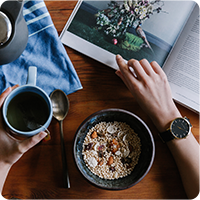Het arrangement 13.4 - Healthy habits - hv12 is gemaakt met Wikiwijs van Kennisnet. Wikiwijs is hét onderwijsplatform waar je leermiddelen zoekt, maakt en deelt.
- Auteur
- Laatst gewijzigd
- 11-05-2025 19:29:40
- Licentie
-
Dit lesmateriaal is gepubliceerd onder de Creative Commons Naamsvermelding-GelijkDelen 4.0 Internationale licentie. Dit houdt in dat je onder de voorwaarde van naamsvermelding en publicatie onder dezelfde licentie vrij bent om:
- het werk te delen - te kopiëren, te verspreiden en door te geven via elk medium of bestandsformaat
- het werk te bewerken - te remixen, te veranderen en afgeleide werken te maken
- voor alle doeleinden, inclusief commerciële doeleinden.
Meer informatie over de CC Naamsvermelding-GelijkDelen 4.0 Internationale licentie.
Aanvullende informatie over dit lesmateriaal
Van dit lesmateriaal is de volgende aanvullende informatie beschikbaar:
- Toelichting
- Deze les valt onder de arrangeerbare leerlijn van de Stercollectie voor Engels voor havo en vwo, leerjaar 1 en 2. Dit is thema 13 'Health and welfare'. Het onderwerp van deze les is: Healthy habits. In deze les wordt er aandacht besteed aan gezonde gewoontes. De grammaticaopdracht is een toets waarbij alle behandelde onderdelen van thema 13 aan bod komen (future: will, present perfect, much/many/little/few).
- Leerniveau
- VWO 2; HAVO 1; VWO 1; HAVO 2;
- Leerinhoud en doelen
- Engels;
- Eindgebruiker
- leerling/student
- Moeilijkheidsgraad
- gemiddeld
- Studiebelasting
- 1 uur 40 minuten
- Trefwoorden
- arrangeerbaar, engels, gewoontes, gezond, grammaticatoets, hv12, little and few, much and many, stercollectie

 The subject of this double period is healthy habits.
The subject of this double period is healthy habits.

 You are going to watch a
You are going to watch a 

 Study the vocabulary. (10 minutes)
Study the vocabulary. (10 minutes)





